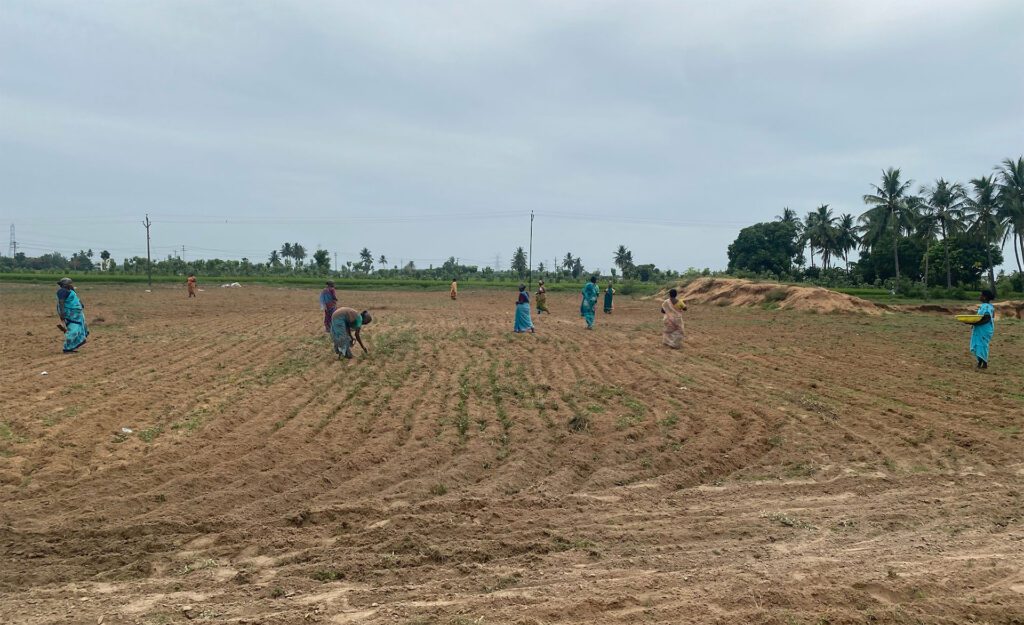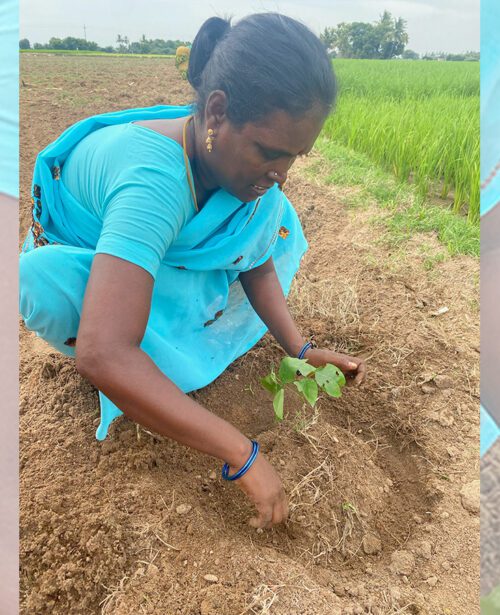Shakila Kalaiselvan is the founder and leader of the Pallur Dalit Women’s Collective in Arakonam, Vellore District in Tamil Nadu, India.
The Pallur Dalit Women Collective was formed in 2016 when Shakila sought the help of the Society of Rural Education’s (SRED) Dalit Women’s Movement to claim 7.5 acres of illegally-occupied common land (waste lands) in two areas in their community. After series of training meetings on Dalit Rights and Land Rights, Shakila organised and mobilized 40 Dalit women to assert their entitlements at the District Administration for Land Titles.
Growing up, Shakila had a very rough childhood. Her parents were landless agricultural laborers. Her father eventually left them for another woman, leaving her mother to raise two daughters single-handedly. Shakila saw how her mother had to struggle to support them with very measly labor wages. “She worked every day in the fields, but when it was time for harvest we always still had nothing to eat.”
Now, with the women’s collective farm, Shakila attests, “This is the first time in my life that I get to bring home whatever I harvest. Before I couldn’t do that with my labor wages. It is the best feeling, to know that you are tilling your own land and growing your own healthy food.”
Shakila and the Pallur Dalit Women Collective availed of the trainings provided by SRED on organic farming and agroecology. SRED also supported them by providing a solar water pump to irrigate both lands. They were also provided with agricultural instruments and seeds that helped them preserve their own organic seed bank. Through the women’s perseverance and collective action, the lands became fertile and rain-fed, free of chemical pesticides and fertilisers.

As Dalit women who historically were not allowed to own lands, be independent in decision-making and were always discriminated against due to caste and gender, Shakila and the Pallur Dalit Women Collective serve as inspiration to all Dalit women. Because of their success, Shakila was able to mobilise 40 more women to occupy another 2.5 acres of land in Pallur. The collective had also already identified some 18 more acres to claim and have started an organic seed bank in preparation for organic farming in these lands.
Through the years, as a collective, the women have been cultivating and harvesting lentil, corn, green gram, red gram and millets. SRED assisted them with various training programs on natural farming methods, including the preparation of vermicompost, natural manure and biopesticides.
The collective members equally share the produce after harvest. They built their own water tanks and rainwater-collecting ponds from scratch. They put up their own pipelines for irrigation. They have also set up their own office where they keep their agricultural instruments and seeds for organic farming.
To share their successful and inspiring story, Shakila also travels to attend meetings and conferences at the local, national and regional levels. She attended the Regional Comprehensive Economic Partners (RCEP) meeting in Hyderbad, the All India Kissan Movement in New Delhi, the Delhi National Conference of Women organised by Makaam, and the National Dalit Conference in Pune to represent landless Dalit women, promote organic farming and agroecology. ###
Women In Agroecology: Towards Pesticide-Free Communities is a continuing storytelling initiative of PAN Asia Pacific and its partners to document stories of rural women who are survivors of pesticide poisoning and/or making the transition to agroecology.
Our contributing partners: Shikkha Shastha Unnayan Karzakram (SHISUK), Bangladesh; Society for Rural Education, India; Gita Pertiwi, Indonesia; Thanal Trust, India; PAN India; and Sustainable Agriculture and Environment Development Association (SAEDA), Laos


